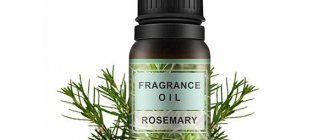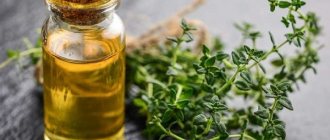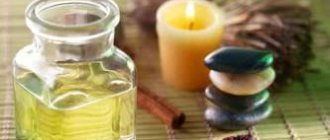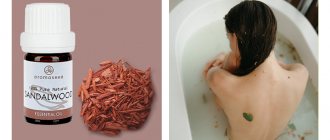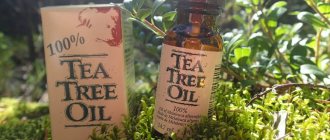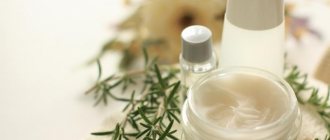Products based on natural ingredients are very popular in cosmetology. People who suffer from problem skin will love a recipe like using rosemary oil for acne.
The plant element has a rich biochemical composition, thanks to which it is widely used among lovers of natural cosmetics. The leaves of the bush have tightening, antioxidant and refreshing effects.
Product Description
A valuable oil extract in industrial production is obtained from young shoots and leaves of an evergreen tropical subshrub belonging to the Lamiaceae family. Rosemary officinalis is a very heat-loving plant that is found mainly in regions with tropical and subtropical climates.
But decorative varieties of this useful representative of the flora take root well in the southern regions of Russia, and some species are successfully grown even on a home windowsill. Therefore, any housewife can obtain rosemary oil for cosmetic needs if desired.
True, special equipment is used to produce etherol, since the product is obtained by steam distillation. At home, a simpler method of maceration is used, in other words, infusion of a plant base on any base oil.
Rosemary oil can be used in its pure form or combined with other natural ingredients.
Composition of rosemary oil
An essential extract obtained from the inflorescences and leaves of a tropical shrub, in appearance resembles a liquid, transparent substrate of a yellow hue. The pleasant aroma of the product contains mint notes. Special attention should be paid to the composition of the oil, since rosemary is useful for acne due to the presence of certain components:
- vitamins are contained in etherol in huge quantities: these are ascorbic and nicotinic acid, almost the entire group “B”, retinol, tocopherol;
- mineral elements: iron, copper, phosphorus;
- organic acids;
- tannins;
- resins;
- essential components (camphor, borneol).
During the processing process, the bulk of the substances are preserved, so rosemary oil has exactly the same set of beneficial effects as fresh plant material.
When rosemary oil is combined with other esters, the effect of the active substances is only enhanced.
Where is the best place to buy
You can purchase it at a pharmacy, natural cosmetics store, or place an order online. Sold in dark glass bottles with a dropper dispenser , price 10 ml from 120 to 800 rubles .
The oil is stored at room temperature away from sunlight, shelf life is 2 years. You can distinguish a high-quality broadcast by the following criteria:
- the manufacturer indicates on the label “100% natural product”, as well as the Latin name - Rosmarinus officinalis;
- it is impossible to determine authenticity by cost, but one brand cannot produce different esters at the same price; rosemary is more expensive than, for example, citrus esters;
- the smell of the oil may not coincide with the aroma of the plant that became the raw material for production, and manufacturers of synthetic products try to get as close as possible to the bouquet of rosemary, so only professionals can focus on the aroma as a quality criterion;
- It is difficult to check spoiled oil by external signs; you should take into account the information on expiration dates specified by the manufacturer.
Beneficial features
Rosemary essential extract is highly valued in cosmetology. On an industrial scale, it is added to creams, shampoos, and other facial and hair care products. At home, you can also prepare effective remedies using this product, which is unique in composition and properties. The properties should be given special attention, because rosemary oil has the following effects:
- antioxidant;
- anti-inflammatory;
- tonic;
- painkillers;
- tightening;
- regenerating;
- rejuvenating.
The product is well absorbed into the dermis, penetrating into its deepest layers. Thanks to this ability, the components of the composition begin their work at the cellular level.
The main worthy quality of rosemary oil is its ability to stabilize the sebaceous glands, which is especially useful for oily and problematic skin. With regular use of ether, the skin restores its elasticity, it becomes soft and velvety, its color is evened out, and pimples and age spots disappear.
How does rosemary work on problem skin?
The described flower has many properties and each of them has a special effect on problem skin. Let's figure out when using rosemary is beneficial.
- This plant helps remove excess fat from the face and body. It tightens the pores and therefore eliminates the unnatural shine of the skin. As a result, the skin looks healthier and feels better;
- Elimination of inflammatory processes in the epidermis. The oil has a strong bactericidal effect. In dermatology, it is used for skin rashes of various etiologies (boils, carbuncles, dermatitis);
- For those with a dry type of epidermis, rosemary will be a revelation due to its ability to nourish the skin. After using it, the skin will be nourished and peeling will disappear;
- The oil restores the water-lipid balance of the epidermis and relieves swelling;
- It smooths out wrinkles, making the skin smooth and elastic;
- Removes cosmetic defects such as age spots. The face takes on a fresh and healthy appearance.
After regular use of rosemary-based products, the epidermis becomes cleaner and fresher, acne gradually disappears.
Before using this herb for treatment, you should remember to consult a dermatologist. It is possible that using oil alone will not solve the problem, but in combination with other drugs it will significantly improve the condition of the skin.
In what cases is rosemary ether useful?
From the description of the characteristics of rosemary it follows that this plant has powerful healing properties, which expands its possibilities for use in home cosmetology.
Since rosemary essential oil combines many beneficial properties, it is recommended to use it:
- for the treatment of skin inflammatory diseases: acne, pustules
- to prevent dermal problems;
- to cleanse your face, simply wash your face with rosemary oil;
- to combat oily shine and pores;
- when the first age-related changes appear in women after 30 years, it is also worth using rosemary oil;
- in order to get rid of age spots and scars.
As you can see, rosemary oil can be considered a universal remedy. Moreover, the universal qualities of the product can be seen in the fact that it is suitable for eliminating problems of any skin type:
- dry dermis and gives it elasticity, as it stabilizes the water balance.
- The oily dermis quickly gets rid of acne spots, and also normalizes the function of the sebaceous glands.
- For normal skin, rosemary oil is an ideal daily care product, as it cleanses well and saturates the dermis with nutrients.
- The ether smoothes and refreshes aging skin
The universal properties of rosemary oil improve hair condition and prevent dandruff.
A little history
Rosemary is translated from Latin as “sea dew”; on the sea coast today you can find shrubs with thin needle-like leaves. The ancient Greeks considered the plant a symbol of the goddess Aphrodite, endowing it with the ability to give happiness, love and youth. Fragrant twigs were used not only in cooking and medicine; in Ancient Greece and Ancient Egypt, temples were fumigated with shoots of the bush.
By the way. In the Middle Ages it was used against plague, infectious diseases, toothache and headaches.
Essential oil was first obtained in the 14th century, and in the 17th century, “Queen of Hungary’s water” was created, a universal remedy that was also used for cosmetic purposes. In France, rosemary water was popular among court ladies; Napoleon appreciated its tonic effect.
Ways to use rosemary oil in home cosmetology
It is clear that for each problem there is its own method of effective combat. But all the ways to use rosemary oil at home are easy to implement. Even compositions that seem complex at first glance can be easily prepared at home. Rosemary essential oil is used in its pure form; compositions for medicinal compresses and masks are prepared on its basis. Special oil mixtures are very popular.
The choice of recipe depends on skin type, as well as individual sensitivity. The effect of essential products is so powerful that especially sensitive skin may experience irritation and other allergic manifestations after their use. This point must be taken into account.
Contraindications for use
Like any medication, essential oil also has conditional contraindications. These include:
- pregnancy and lactation;
- children under nine years of age;
- tendency to develop allergies;
- epilepsy;
- individual intolerance to the components that make up the essential oil.
To achieve the desired effect and prevent adverse reactions, it is important to know the correct and clear proportions. Side effects include itching, redness and flaking. Before using the product, it is better to do a test by applying a drop of oil to your wrist.
Rules for using rosemary oil
Since it is now known for sure that rosemary oil is used for acne spots, acne, and wrinkles, it remains to remember a few important rules for its use:
- Before using for any purpose, it is advisable to conduct a sensitivity test;
- when creating oil mixtures, the dosage must be strictly observed;
- if the oil is used for spot application, you need to monitor the condition of the skin;
- when the first signs of irritation appear, the dose of the essential product should be reduced;
- the frequency of procedures depends on the individual characteristics of the skin;
- after masks, the remaining composition should be removed with a paper napkin;
- Cosmetic procedures are not recommended to be done at night, as the strong aroma of the ether can cause insomnia.
Application for lips, eyelashes, hair
Rosemary is used to care for curls, add shine, shine, and prevent gray hair. Helps strengthen the root system, restores hair after extensions and perm. Enhances growth by accelerating blood flow and saturating the follicle with active elements. Fights dandruff and seborrhea, eliminates itching of the scalp .
Effective use in massage mixtures, oil applications, aromatherapy. You can also enrich shampoo, conditioner, spray, it helps reduce the secretion of sebium, giving volume and a well-groomed look to your curls. To restore dull, porous hair, it is recommended to use an oil rinse, mix 1 liter of water or herbal decoction with 3-5 drops of rosemary ether. Rinse your curls with the finished product after washing; your hair will be silky, elastic, and easy to style.
An effective product helps restore firmness and elasticity to the body. An effective product eliminates cellulite , stretch marks, sagging skin, and helps in correction .
Important point! Ether is not used to care for eyelashes, eyebrows, and lips. May cause swelling, tearing, and irritation of the mucous membrane.
To strengthen eyelashes and nourish lips, it is better to use base oils that have a mild effect.
The best recipes for beauty and healthy skin
In the collection of recipes with rosemary oil, you can choose the best option for solving even the most complex problems of the facial dermis. As an example, we present several effective recipes that will help you rejuvenate your appearance at home and restore your skin to a healthy, attractive appearance.
Easy way
With regular use, this simplest method will help get rid of acne. To do this, you need to prepare a mixture of rosemary oil with any other ether, and then apply it to problem areas. An extract from cumin and tea tree goes perfectly with rosemary oil. In this case, per spoon of cumin oil there are 2 drops of rosemary essential oil.
Compress for scars
It is known that the most unpleasant consequence of acne is spots and scars. You can get rid of post-acne and similar defects on the skin using medicinal compresses with rosemary oil. To do this, you need to apply 2-3 drops of ether on a cotton pad, apply it to the affected area, and then secure it with a band-aid. Such mini-compresses should be kept for 2-3 hours. If the burning sensation is severe, the procedure time is reduced. It is not recommended to repeat therapeutic procedures more than 3 times a week.
A mixture of oils: rosehip, wheat germ and rosemary in a ratio of 4:3:1 will quickly remove acne marks.
Another excellent option for practical use is a mixture of a tablespoon of sea buckthorn oil and 2 drops of rosemary ether.
Using essential oils for acne
The positive effects of essential oils have long been known to lovers of folk remedies. The substances actively act on the upper layers of the epidermis, providing the following effects:
- antiseptic. The oil disinfects and cleanses the skin;
- anti-inflammatory. The product prevents the formation of redness, rash, itching;
- restorative. The affected areas of the skin regain smoothness, elasticity, and a healthy appearance. Oils such as eucalyptus, pine, tea tree, and flower oils are highly effective against acne.
- Depending on the source raw material, the following properties of oils can be distinguished:
Separately, it is worth noting the effective effect of rosemary essential oil on skin problems. Creams and lotions with the addition of this herbal component show significant results in the treatment of acne at home.
Cosmetic properties
Cleansing the skin with rosemary oil is a common skin treatment method. The product has an analgesic, antiseptic and restorative effect on the epidermis. With regular use, the external characteristics of the skin increase: the tissues become more elastic, soft, and pigmentation decreases.
Rosemary extract regulates the fat balance of the skin, stopping excess secretion of the sebaceous glands.
Rosemary-based oil is popular not only as part of a mask or scrub, but also for internal use. Regular use of this supplement provides improvements in the functioning of the cardiovascular system and gastrointestinal tract.
Vitamin composition
Rosemary esters appear as a transparent yellowish liquid with a pleasant aroma of flowers and mint. Rosemary oil for acne has become widespread thanks to the beneficial microelements it contains:
- cineole;
- alpha-pinenes - healing components of plant cells;
- camphenes;
- camphor;
- tannins;
- amorphous resins;
- limonene.
The rich chemical composition can be easily enhanced by combining the oil with other essential products or cosmetics.
Beneficial features
Masks with rosemary oil help eliminate acne, cleanse dirty pores, and improve overall skin tone.
The beneficial properties of the herbal remedy include the following:
- promotes hair growth and restoration of damaged hair follicles;
- serves as a prevention of dandruff formation;
- prevents baldness;
- regulates sebum production;
- accelerates the healing of scars, tightening of scars;
- evens out the color and structure of the skin;
- makes the skin soft and elastic.
Washing with oils leads to an improvement in external characteristics: the pores of the face are reduced, the greasy shine disappears, and the skin becomes velvety.
Thanks to its antiseptic effect, rosemary cleanses the skin of pathogenic bacteria and microbes. Local inflammation is eliminated. These properties make rosemary ether a universal aid for dermatological diseases.
Selection by skin type
The essential oil itself has a very high concentration of active ingredients, so using it as an independent medicine can be dangerous. Competent oil therapy involves a diluted essence of one or more components.
Depending on the desired effect, rosemary is recommended to be combined with natural oils from the following ingredients:
- olives or almonds - moisturize skin prone to dryness and flaking;
- tea tree - eliminates acne;
- milk thistle and grapes - control over fat content;
- apricot and other fruit extracts - against wrinkles;
- sunflower - against burns.
For women over the age of 30, ether will slow down the aging process. The natural product prevents the formation of pigmentation and wrinkles.
The great advantage of rosemary is that you can use it yourself at home. If you are prone to allergies, you should consult a doctor before use.
Contraindications
Esters have virtually no contraindications for external use. Compresses and masks can cause an allergic reaction, so the only reason not to use rosemary is its individual intolerance.
The pungent odor may be a contraindication for people suffering from epilepsy and women in late pregnancy.
